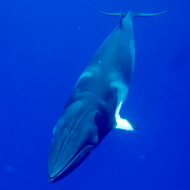New proposals to protect Scotland’s seas

The four new MPAs would make Scotland the first country in the world to provide designated areas for protecting minke whales.
The Scottish Government is proposing four new marine protected areas (MPAs), which would make it the first country in the world to provide designated areas for the protection of minke whale and basking sharks.
A 12-week consultation on the proposed MPAs was launched on World Oceans Day (8 June).
Covering a combined area of more than 5,000 square miles, the MPAs would also protect Risso’s dolphins and a range of biodiversity and geographical features.
Scotland’s MPA network currently covers 22 per cent of the country’s seas and consists of 231 sites. It supports nature conservation, protects historic marine sites and helps develop new approaches to marine management.
Mairi Gougeon, Scotland’s minister for the natural environment, said: “It is our duty to help protect and enhance our marine environment so that it remains a prized asset for future generations. Not only are they fundamental to our way of life, they provide habitats for a huge diversity of marine wildlife and it is vital that we ensure appropriate protection for them.
“Scotland’s seas account for 61 per cent of the UK’s waters and are internationally recognised as being important for whales, dolphins and basking sharks. These MPAs would offer additional levels of protection to these species, and ensure the MPA network is fully representative of Scotland’s marine diversity.”
The government is asking people to share their views on the proposals by taking part in the consultation.



 The Federation of Independent Veterinary practices (FIVP) has announced a third season of its podcast, Practice Matters.
The Federation of Independent Veterinary practices (FIVP) has announced a third season of its podcast, Practice Matters.